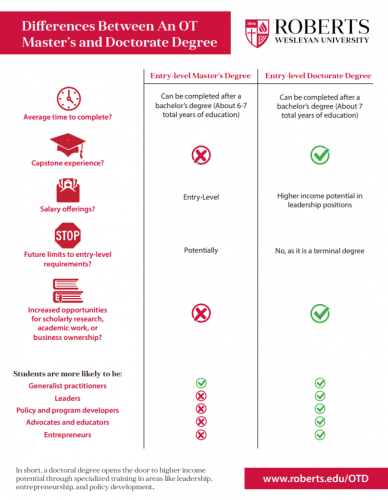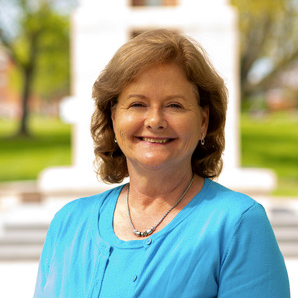News
Looking for the latest news?
Should You Get A Doctorate In Occupational Therapy?
If you had two choices where one locked you down and one unlocked your full potential, which one would you take?
If you’re like me, you’d take the second option. Great, we already have something in common!

Hi, I’m Jim. I spend my days helping people like you revolutionize the world of occupational therapy through education.
Yes, you can practice occupational therapy with only your master’s degree. However, as my mother always said, just because you can doesn't mean you should. (Thanks, Mom.)
If I didn’t think the doctorate degree truly made a meaningful difference, I wouldn’t be writing you this article. But I do believe in this program, so here I am.
Now, how and why exactly does it make a difference? Here comes the good part.
The Differences Between An Occupational Therapy Master’s and Doctorate Degree

That’s the information at a glance! If you’re already interested, email me at sheetsj@roberts.edu, where we can dive deep into your questions.
If you’re not sure yet, keep reading. I’ll share more student perspectives and reflection from our practitioner faculty. Let’s hear from a current student, Shae.
"The doctorate was right for me because I'm interested in management or teaching. I feel incredibly confident and satisfied with my decision." -Shae Davis '24 (Occupational Therapy)
A Doctoral Degree Prepares You Better
One of my favorite aspects of the doctorate program is how much more prepared our students are. If you have any desire to become an educator, leader, or program developer, you should strongly consider a doctoral program.
Take it from Gavin, a current student.
"Having a doctorate opens many more doors, especially in conducting research or becoming a professor. I chose the doctorate because I wasns't really sure what I wanted to do yet, so having more options in the future was a draw for me." -Gavin Marsh '24 (Occupational Therapy)

We asked Dr. Kathleen Stoklosa (Program Director, Associate Professor) what she loves most about the curriculum she teaches. She said, “I love preparing students to be capable in all management functions, including roles like consulting. Because of the small class sizes, I can tailor my coursework to the students.”
She adds, “The doctoral preparation is more extensive, as it includes more preparation to be an entrepreneur, to develop community programs, and to consider working in non-traditional healthcare, such as in a homeless shelter.”
For example, if you earned your doctorate degree, you could work as an ergonomic consultant, at a non-profit organization, or in program development.
Here are some of the unique courses that better prepare you for those roles.
- OTD: Educators
- Occupational Justice: Ethics and Advocacy
- Professional Development III: Emerging Practice Entrepreneurship
- OTD: Leaders and Managers
- Professional Transitions
- A series of classes dedicated to research
Unlock Your Future with a Doctorate Degree
In 2019, the AOTA considered mandating the doctorate degree as the single point of entry for the field of occupational therapy. After much debate, the assembly upheld the dual point of entry policy, meaning one can enter the field with either a master’s or doctorate degree.
However, that’s not the end of the story.
EMSI, a leading labor market analysis firm, shared that from June 2020 to June 2021, 62,541 healthcare managerial position postings required a doctoral degree.
Having your doctorate degree can be a major differentiation - or the only way to meet rising standards in the future - in a competitive market.
Last, the doctoral degree is terminal, the highest academic degree one can receive in a particular field. This means, if you compare it to the average two or more years of a master’s degree, earning your doctorate is only adding one more year of higher education.
"I wanted a doctorate because I felt that it made more sense to earn a higher level education within the same time frame as it would to earn a master's degree." -Brittany Daymon '24 (Occupational Therapy)
Climbing the Summit of Your Doctorate’s Capstone

Dr. Julia Arau, our fieldwork coordinator, says, “The capstone is really what sets the entry-level doctorate from an entry level master’s degree. In the capstone, students have the opportunity to engage in projects that are meaningful to them and that provide in-depth experiences into areas of practice, such as advocacy, education, research, theory, and development.”
You’ll be paired with a mentoring faculty member and a site member. You’ll design and present your own project, spending over 500 hours in the field in your area of choice. For example, you may design a plan for educating caregivers of a particular population you are passionate about. Learning how to write grant proposals and curriculum is just the beginning.
Questions to Ask Yourself As You Consider A Doctorate Degree
- Do I want to learn how to lead?
- Do I want to make a difference?
- Do I want to teach others?
- Do I want to be a researcher?
- Do I want to develop emerging areas in the field of occupational therapy?
If you’ve answered yes or maybe to any of these questions, I firmly believe you need the credentials and opportunities of your doctoral degree. What do you think?
Email me at sheetsj@roberts.edu.
Thank you for reading!
Sources
https://www.franklin.edu/blog/is-a-doctorate-in-healthcare-administration-worth-it



